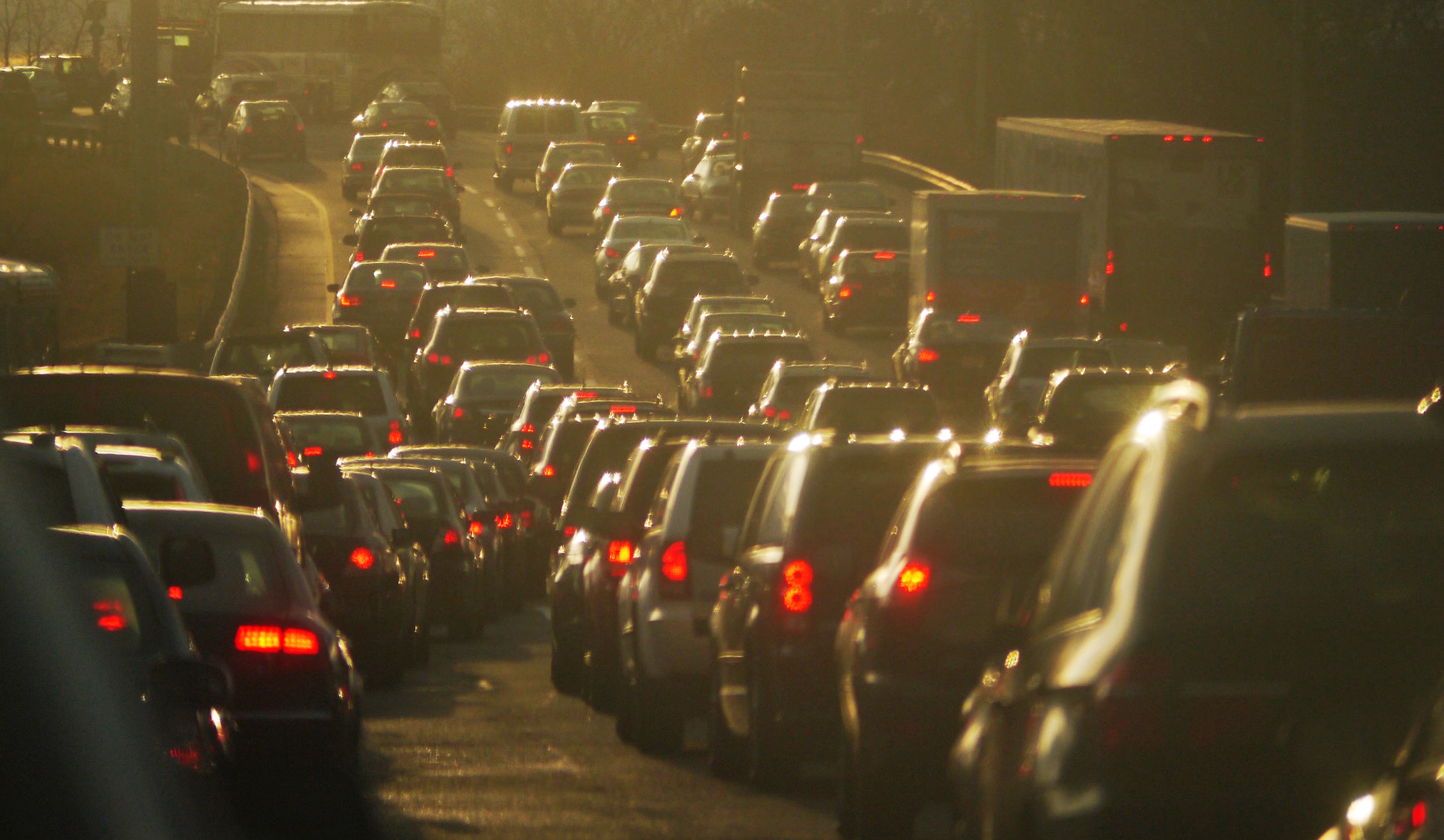One of America's most critical transportation climate rules is in jeopardy even before it's even enacted, thanks to a new lawsuit by a coalition of mostly red states that could halt progress towards the even stricter standards that advocates say we need.
Just before the Christmas holiday, 21 states quietly filed suit against President Biden, federal Department of Transportation Secretary Pete Buttigieg, Federal Highway Administrator Shailen Bhatt, and the US DOT itself over the new "Net Zero Highway rule," which requires states to track greenhouse gas emissions on their roads and set targets to reduce them. A separate, similar suit was also filed by the Texas attorney general, threatening to delay the initial implementation of the law, which is set to begin Jan. 8.
Largely recognized as a simple "sunshine law" with little power to actually rein in highway pollution, the Net Zero Highway rule doesn't actually specify how states should measure the climate impacts of their transportation choices, nor does it impose any penalties if states miss their entirely self-imposed reduction targets — which, to be clear, do not need to be set anywhere near zero. Still, advocates say it's a critical first step towards more meaningful transportation reform.
The plaintiffs, meanwhile, are treating the law as a dire threat.
In a statement, Montana Attorney General Austin Knudsen said the rule would impose an onerous administrative burden on state departments of transportation, while stymying economic progress and harming rural communities that, he says, need to increase emissions in order to grow their economies.
"This rule is another unlawful and overreaching regulation by the Biden Administration to force the President’s radical green agenda onto Americans regardless of the costs," added Knudsen. "This one-size-fits-all approach might work for the Washington, DC bureaucrats who cooked it up, but it won’t work for Montana.”
That logic, though, seems suspect to advocates like Beth Osborne of Transportation for America. State DOTs, after all, are massive government agencies that often enjoy multi-billion-dollar budgets, and they already track all the variables necessary to estimate their current transportation climate impacts, not to mention their future ones — even if they don't share those numbers widely with the public. The lawsuit itself admits that nearly every plaintiff state's infrastructure investments either "could" or "will certainly result in additional vehicular traffic and, thus, CO2 emissions."
"They’re saying they don’t have the capacity to measure greenhouse gas emissions, and in the same [document], they’re saying they do; I’d like to know which it is," Osborne said. "Do they have the information, and they could share it, but they just don’t want to? Or are they unable to determine the carbon impacts of their investments? ... Because if they can’t, maybe we shouldn’t entrust them with this money in the first place — and give the money to the cities, which could."
Osborne also doubted the plaintiffs' argument that predominantly rural states simply need to trade heavy emissions for "economic progress" — or that rural residents necessarily benefit from that exchange. A 2021 analysis from Transportation for America found that as their communities grow more car-dependent because of dwindling job centers, hollowed-out main streets, hospital closures, and the erosion of already-scarce transit, rural families are actually losing access to economic opportunity rather than gaining it, while forgoing discretionary driving trips they can no longer afford as commute distances climb.
"There's this idea that as people drive more, it’s good for the economy, but that is a very questionable hypothesis," she added. "When people drive more, it costs people a lot of money — money that could be used on more wealth building enterprises like education or home ownership or retirement. ... We're disinvesting in rural communities and making rural households travel further for jobs and basic necessities. We should be looking for efficiencies that get people where they need to go with less travel and less cost."
21 state governments demanding the right to increase carbon emissions from highways, and keep it secret from the public. https://t.co/RJzeUIUYq9
— Mike McGinn (@mayormcginn) January 3, 2024
Osborne suspects the states' real reason for the lawsuit has more to do with "virtue signaling that they’ll fight anything associated with climate," as well as resistance to even modest change to federal formula grant programs that "allow states to spend vast amounts of money without any oversight whatsoever."
She added, though, that the lawsuit still stands a "decent chance" of killing the Net Zero Highway Rule — and if it does, it will delay the implementation of a critical policy that was first introduced way back in the Obama administration, reintroduced at the start of the Biden administration, and badly delayed during the pandemic.
"This was a screw-up by US DOT," Osborne adds. "Why they took three years basically to issue the same rule that had already been issued seven years ago is beyond me. ... Whether or not they win in the end, they could lose several more years of climate progress. That does not show the level of priority by the Biden administration that is needed to address catastrophic global climate change."
While the courts work it out, Osborne said nothing is stopping advocates from using publicly available information to write their own states' transportation emissions report cards — and holding them accountable for what they find.
"My big question is: what are they trying to hide?" she added.
The suit was filed by the following states (and two commonwealths): Kentucky, South Dakota, Alabama, Alaska, Arkansas, Florida, Idaho, Indiana, Iowa, Kansas, Mississippi, Montana, Nebraska, North Dakota, Ohio, Oklahoma, South Carolina, Utah, Virginia, West Virginia, and Wyoming.






